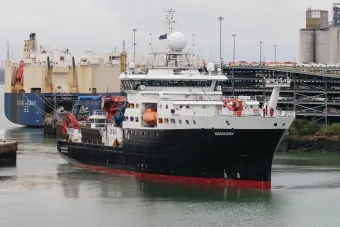
The Royal Research Ships James Cook and Discovery are cautiously resuming scientific research expeditions following the suspension of the Marine Facilities Programme earlier in the year due to Covid-19.
Expeditions are resuming with minimal embarked scientific and technical parties and involving UK-to-UK or UK-to-Falkland Islands passages in the first instance. As the situation evolves and based on our learning experiences we are planning for for a resumption of more ambitious expeditions with larger science parties after Spring 2021, depending upon circumstances and the guidance in place at the time.
The NOC’s COVID-19 response strategy has prioritised the health and safety of embarked personnel; minimising the risk of bringing Coronavirus infection onto the ships and sailing with infection on board; and being able to recover a re-planned expedition programme as efficiently as possible when safe to do so. After a period of layup following the suspension of the expedition programme in spring 2020, both ships underwent scheduled refits over the summer which saw essential planned maintenance carried out to the hull and engines, as well as the ship-fitted scientific equipment This means both ships are now well-placed to begin recovering the re-planned Marine Facilities Programme.
The refit work took considerable planning and close working with the ship yard and contractors to ensure it was conducted in a COVID-safe manner. Over the summer period, considerable care was taken in design of COVID-safe systems of work onboard including social distancing, cleaning regimes, crewing levels and crew rotations, which involved the use of quarantine as well as progressive introduction of Coronavirus testing as it became available. These measures will continue in operation as we recover the programme.
‘Mobilising’
RRS Discovery returned to home port of Southampton following the refit on Wednesday 23 September. We are now mobilising for the ship’s next research expedition and will sail to the Ellet Array to carry out UK-OSNAP 2020 activity in early October with the NOC’s Prof. Penny Holliday as Principal Investigator. UK-OSNAP aims to improve understanding of the circulation and fluxes of the North Atlantic Subpolar Gyre and will see the recovery and redeployment of moorings and an ADCP (Acoustic Doppler Current Profiler), as well as completing a CTD (Conductivity, Temperature and Depth) section from the Scottish continental shelf.
In November, RRS Discovery will make the annual journey to the Porcupine Abyssal Plain Sustained Observatory (PAP-SO) led by the NOC’s Dr Susan Hartman. The 20-day mission will enable scientists and engineers to service the equipment and gather biological samples. For over 20 years the observatory has provided key time series datasets for analysing the effect of climate change on the open ocean and deep-sea ecosystems.
In December the ship will resume operations under the RAPID project to complete the activities that were left unfinished when RRS James Cook was recalled home in March this year at the start of the pandemic.
Meanwhile, RRS James Cook is currently on operations off the west coast of Africa, recovering equipment that was deployed in 2019. The ship will return to Southampton in the second half of October and is scheduled to sail to Port Stanley in the Falkland Islands in early December to enable scientific research by the British Antarctic Survey.
Leigh Storey, the NOC’s Associate Director, National Marine Facilities, said: “These past months have presented significant challenges. However, thanks to the dedication and professionalism of NOC staff - and in particular the National Marine Facilities team - we are now in a position to safely resume our activities in support of the UK’s oceanographic research programme.”
RRS Discovery arriving in Southampton, September 2020